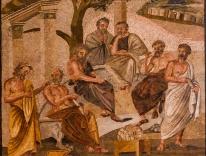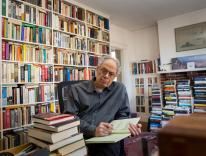
I am what I want, and I have the power within myself to make myself what I want to be, if only I find the will to activate this inner potential—or rather, to manifest this authentic identity. Such is the thesis under review in Tara Isabella Burton’s new book, Self-Made: Creating Our Identities from Da Vinci to the Kardashians. The thesis is not a new one. It has a long history, which, in Burton’s telling, begins around the fifteenth century. Though she finds its philosophical culmination in the eighteenth, with the Enlightenment, most of her story covers the past two hundred years: from bon ton and Beau Brummell to “the two most prominent self-creators of the past twenty years,” Kim Kardashian and Donald Trump. Across Western Europe and the Anglophone world, self-creation as both a transcendent possibility and a moral imperative trickles down to ordinary people’s lives and self-understanding, mutating in tandem with religious, economic, and technological changes. Since creation is traditionally the prerogative of deity, Burton’s story is ultimately about “how we became gods.”
Burton is a reliable chronicler. This book continues a theme explored in her 2020 work, Strange Rites: New Religions for a Godless World. There she argued that rumors of religion’s death in the West have been greatly exaggerated. The God of Abraham may be on life support, so to speak, but other gods are alive and well. We haven’t refuted religion so much as “remixed” it. Postmodern spirituality is a potent cocktail of magic, money, and memes; a hybrid made possible by the internet, the dynamic power of capitalism, and the loss of authority once vested in religious institutions and their ordained leaders. America, at least, is not a land of atheists or even agnostics. It’s full of witches, cosplayers, crystals, fangirls, Proud Boys, and Goop. Is SoulCycle a religion? What about wellness culture? The borders of religion turn out to be porous. Accordingly, Burton suggests we’re misreading the signs of the times. We don’t live in a secular age. The gods haven’t vanished; they’ve migrated. Our age is as religious as any other. You just have to know where to look.
Strange Rites is a vital work of social criticism. Alongside Ross Douthat’s Bad Religion: How We Became a Nation of Heretics, I regularly assign or recommend it to students and pastors wanting to understand the landscape of American religion today. (Teaching the book to a class of undergrads on a small Christian campus in west Texas, I once made the mistake of rolling my eyes at all the hexes and spells. In her final paper for the course, a student unapologetically informed me that she was a witch herself. Lesson learned.)
Self-Made presupposes the “remixed religion” of Strange Rites. Having “turned our backs on the idea of a creator-God, out there,” Burton writes in the introduction, we have
instead placed God within us—more specifically, within the numinous force of our own desires. Our obsession with self-creation is also an obsession with the idea that we have the power that we once believed God did: to remake ourselves and our realities, not in the image of God but in that of our own desires.
The rest of the book lays out how this happened: how desire displaced divinity, how authenticity became the ideal, and how artifice, in the service of profit, unites them all.
A single question frames Charles Taylor’s magnum opus, A Secular Age. How did the nonexistence of God become thinkable—and atheism one permissible option among others—in the half-millennium spanning 1500 to 2000? For Burton, the time frame is the same, but the question is different.
In the premodern West, the divine order was integrated with the social and political order: I am not my own, nor did I make myself; I am part of a larger whole, and both my identity and my purpose may be found in the role that God has bestowed on me through the various authorities that constitute my world. I am a firstborn son, baptized Christian, subject of the throne, peasant farmer, husband, father, and so on. My agency may be more or less operative in each of these interlocking roles, but they are all given. I can no more unbaptize myself than I can crown myself king. I may dream of travel or adventure, of joining a Crusade to the Holy Land, of marrying my true love, or perhaps of priestly missions to evangelize faraway lands. I’m human, after all. But I do not conceive of myself as an autonomous individual capable of fashioning myself into whatever I wish to be—much less possessing the right or duty to do so.
What, Burton asks, transformed that world into the present one? More than half of young people today aspire to be online “influencers,” curating and monetizing a public persona. Call it the three A’s: authenticity via autonomous artifice. The you that you manufacture online is the real you, so long as it’s you who’s doing it. And if what you want in return is money, who’s to judge? It’s your own desires that justify your actions in the first place. Yet a private identity is no identity at all; and if there must be witnesses, why not have them pay for the privilege? Self-creation is thus self-expression plus an audience. “We are CEOs of our own companies, Me Inc.,” as one breathless prediction put it in 1997. One’s “most important job is to be head marketer for the brand called You.” As usual, tech propaganda makes a boast of the nakedly dystopian.
In any case, Burton thinks it rash to blame Silicon Valley for this predicament. She’s not eager to blame anyone, actually. She wants to understand it. So she outlines a genealogy, starting with “divine bastards.” The term, which comes from the Renaissance, describes men whose genius requires explanation. What to make of people like Leonardo da Vinci? Answer: they are exceptions to the rule by dint of a certain special quality they were either born with or fashioned for themselves. The either/or is intentionally ambiguous: Is a genius just “born that way”? Is he specially chosen by God? Does he contain a potential he should be celebrated for actualizing? Or is he, in fact, “the author of his selfhood”—in a word, his own creator?
It is this fruitful ambiguity that Burton traces down through the centuries. On the one hand, we cannot help but ascribe to a Frederick Douglass or an Albert Einstein or an Aretha Franklin a givenness, and thus a gift, for which they cannot themselves be responsible. On the other, we praise them for identifying, developing, and deploying their unique gifts. “Rags to riches” and “the self-made man” are myths in the strictest terms. They define and govern our common social imaginary. We don’t so much believe in them as take them for granted, like gravity.
This ambiguity never quite resolves itself. To be sure, it changes subtly over the centuries. Custom is a useful index—religious custom, certainly, but in particular, politics, clothing, and sex. The Enlightenment calls all of it into question, disenchanting custom without explicitly dethroning religion. The result is a whole cultural bundle: freedom from custom, ambivalence about church, sexual experimentation—these are often just different aspects of the same phenomenon. Think dandies like Brummell, queer icons like Oscar Wilde, or artists like Andy Warhol. Think also of Douglass, an ex-slave turned abolitionist and writer, and Benjamin Disraeli, a middle-class Jew eventually elected prime minister of the United Kingdom. These men didn’t merely rise from obscurity; they invented themselves in the public eye. And they sold audiences, directly or indirectly, on the dream that they, too, could practice self-invention, either through sheer tenacity or through that ephemeral quality it.
The problem, Burton argues, is that it is a scarce resource. By definition, not everyone can be in vogue; not everyone can be invited to every party. Most self-creators relish the resulting inequality. Popularity means nothing if no one’s unpopular. It’s aristocracy by other means, in Burton’s view; an “aristocracy of genius” or of “style,” one defined not by birth or rank but by talent or merit or beauty or bon ton or sprezzatura. The self-creation club is exclusive; the question for any age, including ours, is not whether the club exists but what gets you in.
Burton has her doubts. Throughout her story she describes a “shadow side” to self-creation. First, it continually repristinates a social hierarchy. The problem is acute when the scarcity this hierarchy is built on is not just fame or selective soirees but actual material resources.
Second, the myth of self-creation shifts the blame to society’s losers. A medieval peasant isn’t morally culpable for her station in life, which was not chosen but assigned to her. If, however, someone born on the bottom rung remains there solely through lack of a work ethic, then the poor are like everyone else: they get what they deserve. If only you had a little more grit, says the influencer, you would have my life.
Third, Burton finds the coincidence of artifice and authenticity morally and theoretically suspect, not least since the glue binding them together is money. It may be true that neither demography nor biology is destiny. But much of who and what we are, both socially and biologically, is decided for us in advance. I did not choose to be born. I did not select my parents or siblings, sex or race, nation or language, mental aptitude or likely talents. Though I nursed a hope for it into my teens, I was never going to play professional basketball. Similarly, my crippling motion sickness ruled out a host of careers from the get-go. I’ll never go to the moon. This is no injustice: I am not and never was a blank slate. I am not and never could be my own maker. It’s childish to pretend otherwise. Doing so online, with paid sponsorships populating my live-streamed “life,” is worse than childish—both ridiculous and pitiable.
If this describes the Kardashian temptation, then Burton’s fourth worry is the Trumpian corollary. Self-creation can be bent in a reactionary direction. Between chapters on social Darwinism and Hollywood, Burton discusses Friedrich Nietzsche and a host of twentieth-century strongmen, beginning with Gabriele D’Annunzio and Benito Mussolini. What they peddled, in her view, “was an experiential fantasy. It was the chance to feel like you were an Übermensch, whether or not you actually were one.” Such men “all understood that what people wanted, more than anything, was to feel special, to feel that they, too, had joined nature’s aristocracy, that they, too, had a life that mattered in a world where nothing else seemed to.”
I think Burton is right about the dangers here, but wrong about the appeal. The reactionary figure doesn’t promise his followers that they can become as great as he is. The promise, rather, is that they can bask in his glory while remaining exactly as they are. He promises them vicarious greatness. This is why reactionary and strongman politics is invariably religious in character. It either draws on preexisting piety—throne and altar united—or offers itself as a substitute. Hence its cult-like qualities. Burton’s syncretistic account of postmodern faith fits hand in glove here. Fascism, whether the real article or the more recent LARPing variety, is not just another instance of self-making. It’s a flailing, sometimes violent attempt to recover divine order by imposing social order. Inasmuch as it confuses the latter with the former, exalts a mortal man in place of Christ, and worships power above all else, fascism is a profoundly religious phenomenon. It’s satanic.
Burton’s book, though informed by scholarship (she received a doctorate in theology from Oxford), is a work of popular criticism. It’s meant to distill, synthesize, and paint in broad brushstrokes, without offering easy answers. It succeeds. It’s a whirlwind tour of hundreds of years of cultural history with a single through-line: How, exactly, did our most important job become “head marketer for the brand called You”?
The book ends with a whimper, rather than a bang. Burton says at the start that she aims to avoid offering one more “tragic narrative about cultural decline and the dangers of modernity,” à la “Philip Rieff [and] Carl Trueman.” She doesn’t want to moralize, in other words. For my part, I could do with a bit more moralizing. Granted, simple declension stories are reductive: there is no Golden Age from which we’ve fallen and to which we might return if only we followed a certain political program. Burton’s own ethical intuitions mostly sneak in through parenthetical asides. The book would have been even better if she had made these explicit.
As it stands, we’re left with what is effectively one long train of cultural errors with little more than a proviso that we should not see it as such. We’re offered neither a positive assessment of our self-divinizing moment nor a path forward through its challenges. Must I self-optimize, self-curate, and monetize my self as an online brand? Am I bound to manufacture the “real” me for followers whom I court through increasingly invasive access to my once-private life? Is OnlyFans—the popular website on which ordinary individuals provide paying subscribers “custom (and usually explicit) photographs and videos of themselves”—little more than the logic of our age taken to its natural conclusion? As Burton writes:
Today, self-creation is no longer something some of us can do to set ourselves apart from the people we see as the masses, the crowd, or la foule. Instead, it has become something that all of us must do in order to maintain our financial and social position in a culture that sees reality as up for grabs, to garner the attention central to so much of our internet-driven economic system. Our identities, who we “really” are, have become what we choose and commodify. Reality is what we have made it. We have, at last, become gods.
I wouldn’t hesitate to call this tragic if it were true. But it isn’t. Consider the comprehensive scope of these claims. It may feel to some of us that “everyone,” for example, is on Instagram. Only about 15 percent of the world is on the platform, however. That’s a lot of people. Yet the truth is that most of the world is not on it. The same goes for other social media. Influencer culture may be ubiquitous in the sense that most people between the ages of fifteen and thirty-five are affected by it in some way. But that’s a far cry from digitally mediated self-creation being a universal mandate.
Even for those of us on these apps, moreover, it’s possible to opt out. You don’t have to sell yourself on the internet. You really don’t. I would have liked Burton to show us why the dismal story she tells isn’t deterministic—why, for example, not every young woman is fated to sell her image on OnlyFans sooner or later.
Burton might have introduced some of these moral concerns with her early discussion of the Marquis de Sade. No one but a toddler or a sociopath actually believes that the mere fact that I want something means it is good for me, much less good in general. Yet today a certain kind of compulsory postmodern sadism is on the rise. It is systematically conquering institutions with few willing to stand in its way. Burton defines this anthropology in relation to de Sade: “A human being whose own desires, rather than those of an external authority, gave him the power to make himself the closest thing to a divinity in a godless world.” How? Through “acts of transgression,” achieving “originality” by means of “perversity.” For “the only laws the self-made man lives by [are] his inner desires.”
Such loaded descriptions whet the appetite for more argument. It’s clear that we need the sequel to this sequel, by way of St. Augustine and Pascal. Diversion, desire, identity, and order: an agenda for an alternative modernity. Tara Isabella Burton, call your agent.
Self-Made
Creating Our Identities from Da Vinci to the Kardashians
Tara Isabella Burton
PublicAffairs
$30 | 288 pp.
Please email comments to [email protected] and join the conversation on our Facebook page.
Share
Previous Story
Right-to-Reply Laws
Next Story
George Scialabba’s Prejudice for Progress

